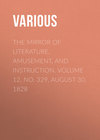Читать книгу: «The Mirror of Literature, Amusement, and Instruction. Volume 12, No. 329, August 30, 1828»
NEW CHURCH, BUILDING AT STAINES

Who has journeyed on the Exeter road without noticing the town of STAINES, with its host of antiquarian associations—as the Stana (Saxon) or London Stone,1 its ancient bridge, for the repair of which three oaks out of Windsor Forest were granted by the crown in the year 1262, besides pontage or temporary tolls previous to the year 1600.—Dr. Stukeley's conjectures respecting the Via Trinobantica passing here—and the old parish church, the situation of which appeared to denote the site of the more ancient town of Staines. It is here too, that the tourist begins to imagine himself in rure, after he has been whirled through the brick and mortar avenues of Kensington, and Hammersmith, and the unsightly lane-street of Brentford,2 with all its cockney reminiscences of equestrianism and election squabbles; Hounslow and its by-gone days of highway notoriety and powder-mill and posting celebrity, and Bedfont, with its yew trees tortured into peacock shapes, and the date 1704. Then, who does not recollect and venerate the convivial celebrity of this route, its luxurious inns, and their "thrones of human felicity;" along which Quin, Dr. Johnson or Shenstone could scarcely have accomplished a stage a day!
In our days, hundreds of London tourists breakfast at the Bush, although, after sixteen miles' ride, their appetites do not require this stimulant any more than do the glories of the Bush cellars after dinner.
But we must pass on to the church. The old building was in the Gothic or pointed style, with lancet windows, &c., but much disfigured by churchwardens' repairs, although the great Inigo Jones is said to have built its square, brick tower. At length, a considerable portion of this ancient structure fell in one Sunday morning, during the service, but, as the newspapers say, "fortunately no lives were lost." The inhabitants then resolved to rebuild nearly the whole, and the design of Mr. J.B. Watson was adopted. The foundation stone was laid March 31, in the present year, and the building is to be completed by Christmas next. The church is intended to contain 1,100 persons. The length of the interior, 65 feet; width, 47 feet; height to ceiling, 25 feet. The chancel is to be rebuilt at the expense of the impropriators. The lower part of Inigo Jones's tower is to remain, and the whole is to be raised 23 feet. These repairs, with the enclosure of the churchyard, will not exceed 4,000l.; and the progress of the undertaking is highly creditable to the taste and execution of all the parties concerned.
As one act of public spirit generally leads to another, the erection of a new stone bridge is projected at Staines; it is to be nearer the church than the present bridge, and will afford a better view of the new structure. An elegant stone bridge was erected here in 1796, but two of the piers sinking, the bridge was taken down, and an iron one substituted; this failed, and has since been supported by wooden piles and frame-work.
THE SPECTRE'S VOYAGE
(For the Mirror.)
"There is a part of the river Wye, between the city of Hereford and the town of Moss, which was distinguished and well known for upwards of two centuries, by the appellation of the Spectre's Voyage; across which, so long as it retained that name, neither entreaty nor remuneration could induce any boatman to convey passengers after a certain hour of the night. The superstitious ideas current amongst the lower orders of people were, that on every evening about the hour of eight, a beautiful female figure was seen in a small vessel, sailing from Hereford to Northrigg, (a small village about three miles distant,) with the utmost rapidity, against wind and tide, or even in a dead calm—landed at the little village, returned, and vanished, when arrived at a certain part of the river, where the current is remarkably strong, about half a mile from the city of Hereford."
–Neele's Romance of History. See MIRROR, vol. x, page 352.
Bright shines the silver queen of night,
Upon fair Wye's soft stream;
Which throws a ray of heavenly light
Reflected from her beam.
Yet this smooth water, wide and clear,
This scene of sweet repose;
Erst filled the villagers with fear
As ancient story goes.
'Tis told us that in dead of night,
(In days of yore long past)
A skiff was seen compact and light,
With sail, and oars, and mast.
And in it sat the spectral form,
Of a most beauteous maid;
Who heeded neither wind nor storm,
As she this voyage made.
Nor heeded she the pelting rain,
Nor winter's blinding snows;
But to the destin'd spot amain,
The scudding vessel goes;
Or if so calm, the placid Wye,
No wave was on its face,
Yet onward did that light bark fly
To reach the fated place.
When on the deck she was espied,
Each trembled to behold;
As on she sail'd 'gainst wind and tide,
('Tis scarce believ'd when told)
Then sail and oar were both applied,
And swift the vessel flew;
But where the man—who could abide
That vessel to pursue?
Ah! who could dare approach the spot
Where Isabel did steer?
That mariner existeth not,
But did that phantom fear.
Or where's the man whose courage bold,
Could lend him strength one hour,
To gaze upon that form so cold,
Or place him in her power.
And when the spectral sail was spread,
That flutter'd to and fro;
The hair would bristle on each head,
Which awful fear did show.
And when the moon-beam seem'd to kiss,
That dreaded maiden's brow;
Something each knew would go amiss,
Nor judg'd such wrong, I trow.
For tho' the form was wond'rous fair,
'Twas terrible to view;
And to avoid it was the care
Of every vessel's crew.
Full many a dismal tale was told,
Of that fam'd spectre ship;
And none were ever known so bold
To watch this nightly trip.
Why did that troubled shade proceed
Along that watery way?
Or what the purpose, or the deed,
Which caus'd her thus to stray?
For good, or bad, did Isabel,
Forsake her dreary grave?
Or was't because she lov'd to sail
On Wye's pellucid wave?
The spectre came to meet her dear,
Lord Hugh—the young and brave;
When dreadful tidings met her ear,
"He'd found a traitor's grave."
When second Edward rul'd this land,
(A wretched prince was he,)
Of favourites he'd a numerous band,
As worthless as could be.
Two noblemen amongst this set
Were hated above all;
And many were the lords who met,
To work the Spencer's fall.
Success attends these foe-men's strife,
Lord Hugh is doom'd to die;
And in his happiest hours of life,
That precious life did fly.
His manly form did never more,
Bless Isabel's fond eyes;
With him—the joys of life were o'er,
For him—the maiden dies.
Yet still the spirit fondly clings,
To what in life has been,
Thus Isabel, it nightly brings
To this beloved scene.
But when her feet have touch'd the ground,
With silent, noiseless tread;
No tender lover there is found,
He's number'd with the dead.
No more of love the tender strain,
Falls on her list'ning ear,
In life—her joy, was turn'd to pain,
Her hope—gave place to fear.
'Tis then, that dread laments they hear,
Who pass by night that way;
Which the scar'd traveller, so clear,
Hears till returning day;
When re-embarks sad Isabel,
That spectre shade so fair;
Then dashing in the water's swell,
She vanishes in air.
No trace remains in Sol's bright ray,
Of boat or awful spright;
For grief—or guilt conceived by day,
Conspicuous is at night.
Thus Isabel's unearthly woe,
Remain'd for many years;
But as our superstitions go,
So go unfounded fears
CAROLINE MAXWELL.
HARVEST HOME
(To the Editor of the Mirror.)
Sir,—Wishing to add to your numerous accounts of our local customs, I send you a description of the manner of celebrating harvest home in Westmoreland.
The farmers of Appleby, Kirby, Thore, and many of the neighbouring and low towns thereabout, devote the last day of the harvest to mirth and festivity. The men generally endeavour to get the corn all in pretty early in the day; and at the last cart-load the horses are decked by the men with ears of corn and flowers and ribands; and then the lasses' straw- bonnets, who, in return, perform the same compliments on them. Thus they move on through the lanes and roads, till they reach the farm-yard, shouting, "Harvest Home," and singing songs in their way. When they reach the farm-yard, they set up an exulting shout, and ale is distributed to them by their master. About nine o'clock, a supper is prepared for them in their master's house. A wheat-sheaf is brought, and placed in the middle of the room, decorated with ribands and flowers, and corn is hung in various parts of the room. The supper mostly consists of some good old English dish, (of which there is plenty,) and the jolly farmer presides at the head of the table. After the cloth is cleared, liquor in abundance is brought forward, and the "president" sings, (not a Non Nobis Domine,) but a good, true, mirth-stirring song, and then the fun commences; singing and dancing alternately occupy the evening, and the bottle circulates speedily, and the festival generally breaks up about midnight.
Thus, Mr. Editor, is harvest home spent in that county, and I send you the only account I can furnish of the harvest merriments, hoping some of your correspondents will add to my little mite.
W.H.H.





















